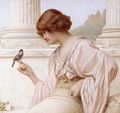Henry Ryland

Henry Ryland (1856–1924) was a British painter, book illustrator, decorator and designer. He was the son of John Benjamin and Elizabeth Ryland and was born in Biggleswade, Bedfordshire in 1856.[1]
He studied in London at the
He exhibited at the

Although he did paint in oils, he specialized in highly finished
Ryland also designed stained glass and his woodcuts were used in a number of magazines, including the English Illustrated Magazine in the 1880s and 1890s.
In 1901 he married Mabel Louise Mann and had one son and one daughter. In 1911 he was living at 32 Fairfax Road, Bedford Park, London, according to Who's Who. He died on 23 November 1924.
Influences and style
Ryland's style mixed themes and subjects from the very different spheres of the Neo-Classical and Pre-Raphaelite movements. His influences include Puvis de Chavanne and Alma-Tadema. Ryland is recognised as the foremost of the neo-classical painters working in watercolour, and is frequently exhibited at the Royal Academy.[3]
Gallery
-
The Captives Return, circa 1890
-
An Allegory of Spring
-
Summer, 1890
-
Rachel at the Well, 1890
-
Asphodel
-
Campaspe
References
- ^ "Henry Ryland".
- ^ Joseph Jacobs, English Fairy Tales, "Henny-Penny" transcript
- ^ "Henry Ryland RI, 1856-1924: An Overview". www.victorianweb.org. Retrieved 11 November 2015.






